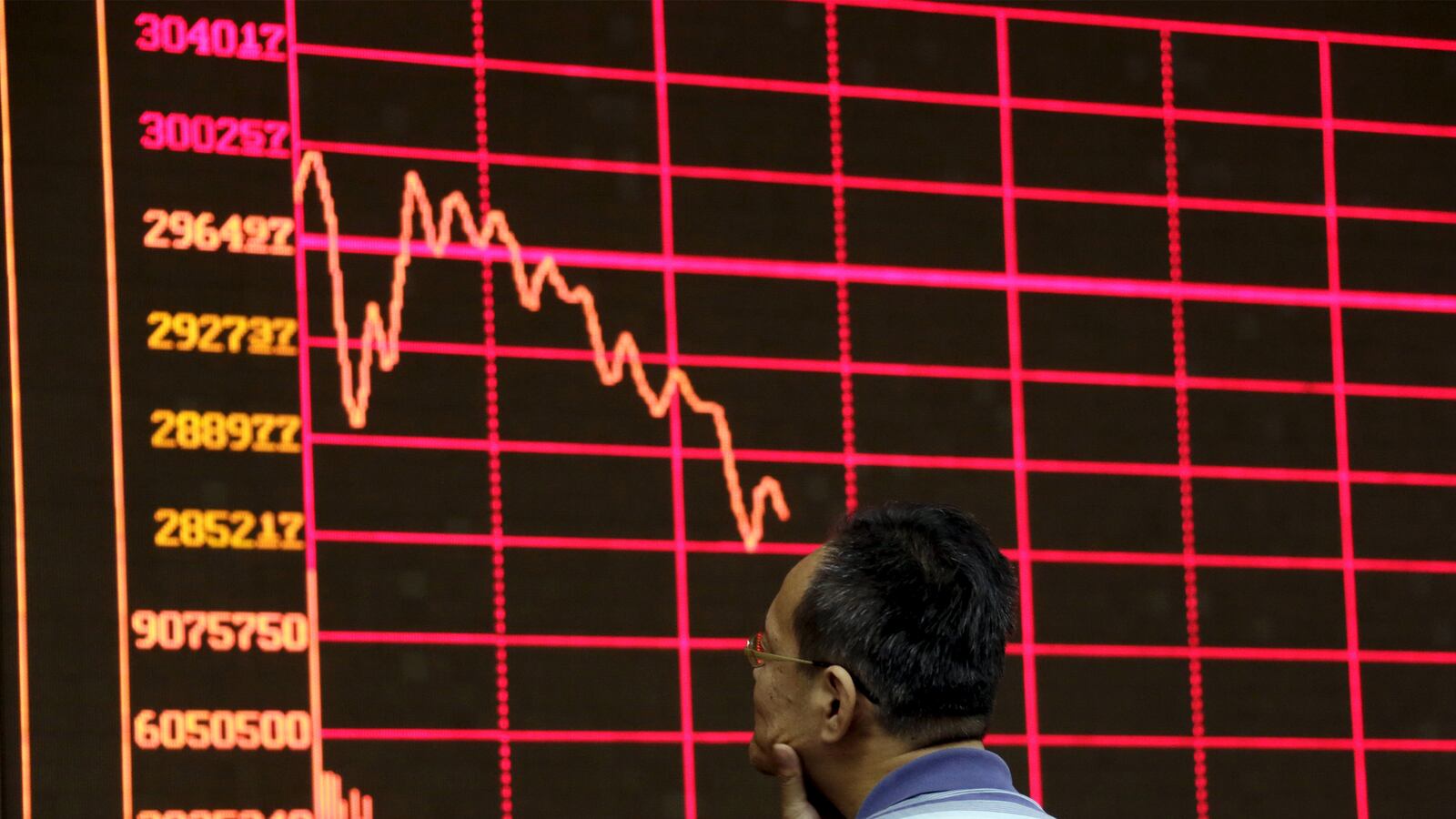HONG KONG — The Chinese stock market has taken blow after blow. And despite an upward bounce on Thursday, recovery is nowhere in sight, so the Chinese government now needs a scapegoat.
Immediately after the Shanghai Composite Index’s July tumble, the Chinese Communist Party (CCP) pointed fingers at an imaginary force of malicious foreign short-sellers who were determined to bankrupt the Chinese everyman and wreak havoc on what the International Monetary Fund considers to be the largest economy in the world. To address the matter, the China Securities Regulator Commission (CSRC) barred Citadel, a U.S.-based hedge fund, from trading on the Shenzhen Stock Exchange.
Never mind that total foreign investment makes up less than 3 percent of tradable market capitalization in both Shanghai and Shenzhen combined. That’s probably not quite enough to manipulate the market, no matter how shrewd Citadel’s foreign devils may be.
To save their stock market, as well as face, China’s securities regulators intervened in many ways. State-owned and state-affiliated firms bought up shares and provided guarantees that they wouldn’t initiate a selloff. The rules for tossing pension funds into risky investments were relaxed. Banks loaned money to companies with stock as collateral.
Those measures didn’t work. The Shanghai Composite Index took another beating this week, losing 16 percent of its value in three days before gaining back 5.3 percent Thursday. The Chinese government, realizing at last that blaming foreign financial powers for the stock market’s current volatility wouldn’t be enough to satisfy public opinion, has turned the spearhead inward.
On Tuesday, Chinese police detained Wang Xiaolu, a financial journalist working for Caijing Magazine, which is an independent publication that provides excellent coverage of China’s political and economic issues, despite having to operate between the ever-moving goalposts of Chinese censorship. Wang was accused of “fabricating and spreading false information about securities and futures trading.”
Wang’s reporting examined how tens of billions of yuan were pumped into the market in July when stocks in Shenzhen and Shanghai were hit the hardest; but when similar circumstances occurred again last week, and Chinese investors were expecting the same reaction from their cash-flushed overlords, nothing happened. This fueled speculation about withdrawals from the funds designed to stabilize the market.
Along with Wang, eight traders from CITIC Securities were detained and accused of “performing illegal trades.” One current and one former employee of CSRC were also taken in and accused of falsifying financial securities and their subsequent distribution.
Unrelated to the series of arrests, five of China’s top brokerages, including CITIC, are being investigated by Beijing for possibly failing to review and verify the identities of their clients.
Officially, these 11 individuals have been detained to “assist the investigation.” As stock markets around the world are feeling the pain as well, China seems determined to solve the mystery of the sensational global nosedive. The culprits, as the CCP sees it, may just be those who are taking a critical look at the dubious short-term measures employed by the Chinese government.
When the Shanghai Composite fell 8.5 percent at the beginning of the week, Xinhua news agency called it “China’s Black Monday.” That term is now censored on the Chinese Internet. Queries for “smart market crash” on Baidu, China’s most popular search engine, were met with a warning that “due to relevant legal and political policy, some search results are not shown.”
The CCP thinks Chinese citizens should throw all their savings and the kitchen sink into the stock market, but don’t have the right to make a peep when the fantasy of easy money implodes.
State-run news media haven’t blacked out all coverage of the stock market’s cascading behavior, but government authorities have issued instructions to delete all traces of certain articles that examine China’s stock market crash. Relevant articles that survive the censors’ cleaver look like afterthoughts that can fit in a tweet, tucked away so the media spotlight can shine on soldiers rehearsing for a massive military parade set for September 3.
Even though 11 Chinese nationals are now in detention, state media still try to place the blame abroad. The Greek debt crisis is brought up often, as are speculations about movement of U.S. interest rates.
The official line is clear: China’s economic problems are caused by the outside, and China is not to be blamed for global weakness. The CCP’s paid trolls might be doing their best to cram that message down every optical fiber cable, but it’s only infantile noise to the rest of the country. “Harmonizing” the news doesn’t kill active, real life discussions that take place in posh teahouses or around mahjong tables, on the street or, occasionally, online. Does the CCP have a meaningful plan beyond its failed interventions? Nobody knows, but everyone’s just praying for the tickers to turn red again.






